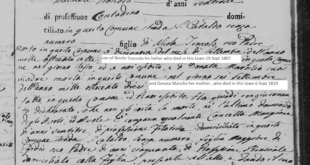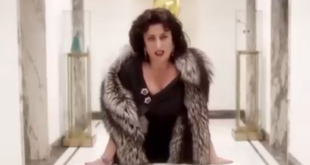Last month, I told the story of a young man named Paolo who died so long ago that nobody remains who can tell anything about him. There are a few impersonal government documents and a grave monument that acknowledge his presence on the earth, but today there is simply no way to ask anyone anything about him. Today, I want to put a sense of urgency on talking to your living relatives who are old enough to remember people who died long ago.
I have lost several relatives in the past couple of months. They lived far away and they were up in age, so it would have been difficult for me to drop everything and fly to other states and sit down with them and talk about the “old days.”
If you have relatives who are “getting up there,” you need to act soon. Here’s why.
Everyone spends a lifetime accumulating knowledge, experience and memories. Some people know how to make stainless steel parts with a CNC machine. Some can give you a pedicure that impresses the other ladies. Some can recite every British prime minister who served the late Queen of England in order! Some remember where they were when Franklin Roosevelt announced the beginning of World War II. They also remember when their older brother announced that he was going to enlist in the Navy even though he hadn’t yet turned 18.
And one day, that person with knowledge, experience and memories will pass away.
Science has done many amazing things, but thus far, there is no method for retrieving the information stored in the memory of a person who has died. It is all gone in an instant.
If you own a computer and the hard drive crashes, you take it to the computer repair shop and they shake their head and ask if you made a backup.
As your family’s chief historian, you are in charge of saving everything you can, and then passing it along to your relatives who will survive you. You need to “make a backup.”
I was inspired to write these columns by the recent presentation at Casa Italia on Family History, but also by a documentary series from Britain called “The Last Voices of World War I.” It was a narrative that included a series of interviews with World War I solders, nurses, widows etc. in the 1990s. At the end of each episode, they showed that person’s picture and the years they were born and died. “C. Aubrey Smith 1899-2001.” Today, every single person who was part of World War I, which lasted from 1914-1918, has died. That documentary is a fascinating account of both little and large events during the Great War.
Since we cannot scientifically retrieve your grandmother’s reminiscence of Dec. 7, 1941, much less her recipe for gnocchi, we have to use more primitive methods to preserve those and other memories for future generations.
We need to sit down with those people who can tell us what they remember about their parents or other relatives are no longer able to tell us themselves. And we need to “just do it.”
Please keep the following in mind. Not everything you hear is the truth. You can ask people about their long-deceased relatives, and they may see the opportunity to either embellish or besmirch the reputation of that person. It’s unfortunate that some battles go on for so long, but the important thing for you as the keeper of the family information, is that you don’t take everything as “gospel truth.” If the person is the child of someone who was famous, they may have an ax to grind and money to be made on a book. (See Bette Davis’ daughter and Bing Crosby’s son, among others). For the many of us who do not come from famous families, there may be unpleasant memories of long-ago family spats that now can be won all these decades later when one of the two parties is no longer able to defend themselves.
So when you record what people say, either with pen and paper or with a video or audio recorder, you are recording opinions, not necessarily facts. When you present that information to other family members, in the form of a family web site, or a book, or just notes in your genealogy data file, make sure to remind future generations that these are recollections of others. Do not type “Poppa Giovanni was a cranky old man who hated his daughters” without mentioning that the source was his daughter who married and divorced four times….
I do not claim to be an interviewing expert, but I can mention that you need to use your time with your relative effectively. If you can find factual data on civil birth, death and marriage documents, you can avoid very dull questions with very dull answers. The goal is to ask them questions that can only be answered by them. “What was your home like when your family turned on the radio in December 1941?”
“Well, I remember Poppa was really angry. He said some nasty things about the Japanese, which I can’t repeat. Momma was very worried. She knew her three sons would have to join the war, sooner or later. She hugged her youngest son who was 15 at the time. He wasn’t going into the service yet but somehow she knew he eventually would. Joined the Army Air Corps as a pilot….. He wanted to be a bigger hero than his brothers, who were already overeseas……..He’s buried in a war cemetery in the Philippines. Momma didn’t mention him for years afterward. It was like he was never born. She had to put it out of her mind. A couple of times, she told an acquaintance that she had five children when she really had six.”
You can’t get that from an impersonal document. Momma and Poppa are no longer around to explain how they felt, but the closest we can get is their surviving daughter who was there when it happened and remembers it a certain way. If you are the relative with the recollection of people who are long gone, it behooves you to record your recollections for future generations. If you’re not sure how to get that knowledge out to the rest of the family, you should contact your family “genealogist” and get together and talk about it.
You will find that not every story is riveting enough to matter to the great-grandchildren of the people in the story. “Nonna used to let us lick the wooden spoon to taste her special sauce.” Maybe a 12-year old who is texting their friends is not all that interested. There is no way to tell. Something like that might be better if you call them over while you’re cooking and let them lick the spoon. Then you tell them that Nonna used to do the same thing.
You may find that you have two types of stories. One type is the regular everyday life that they used to live, and the other would be the amazing out-of-the-ordinary colossal events that changed their lives. The first type will end up being told sitting around the table. “Momma and Poppa would give us money to go to the movies every Thursday. It was half off so we saw the double-feature. My siblings and I didn’t realize at the time that we were being sent “out” for a reason….”
The other type of story may involve major news events, such as the beginning and end of World War II, the Kennedy assassinations, the moon landing, or 9/11. These are events that they have not forgotten, while the everyday life situations are so deeply ingrained that they are just “there.” Both type of recollections are important in putting a picture together of who someone was.
So I suggest the following plan. Print your family tree back at least 4 generations. If you’re really adventurous, print a descendant tree from great-great-grandpa on down. Look at each name and decide who among the living might be able to tell you about that person. Maybe the same person can help you with more than one of the older ancestors.
If you don’t have the best memory, you may need to ask the person for permission to record your discussion. Just promise them that you’ll let them see your written version of their recollection so they won’t feel like you’re trying to catch them on recording saying something bad. If they still won’t consent to being recorded, just take very good notes, and have them repeat a sentence if it seems important. After a few repeats, they might say “oh let’s just record it so you can play it back later!”
At this stage, all you are doing is gathering the raw information. Next, you need to figure out how to turn it into a compelling memoir and make sure your family will be able to learn its history and pass it along to future generations.
See you next month!
 Fra Noi Embrace Your Inner Italian
Fra Noi Embrace Your Inner Italian







